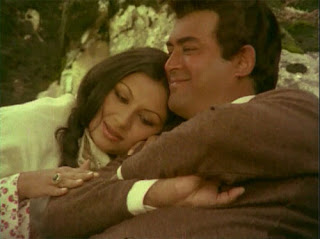
That knocking on the door…
In the process of discovering and experiencing some lesser
talked about or simply forgotten chapters of Hindi cinema, I have being
surprised more than once by the sensitivity of our storytellers. There have
been so many instances of ordinary real life emotions being brought out
extraordinarily on celluloid, that one has to admire the thoughtfulness and the
dexterity of the people who ‘wrote’ our Hindi movie heritage. Almost all the
movies that we see today are a reflection on some or the other film from our
past. Yes, there have been quantum changes in technique, setting, and
circumstances, but the core emotions remain quite the same.
And thus when I saw Dastak,
conceptualized and brought to life by Rajinder
Singh Bedi, one of the stalwarts of Hindi and Urdu literature (and films),
I was quite taken aback. Here is one story that is so unique, and so very
glowing with brilliance, that it has almost no parallel. The idea, the context,
and the sheer execution of this very human and humane drama, is a delight to
watch.
A young recently married couple move into a small house in
one of those crowded and cramped spaces of Mumbai. In a neighbourhood bustling
with activity, the two decide to embark on a lifelong journey together. But all
their dreams and all their expectations go for a toss once they discover the
murky identity of their new abode, i.e. once they discover that just before
them their home was being occupied by a notorious nauch girl and prostitute. Every second day in the middle of the
night when the world sleeps, Hamid
and Salma are harrowed by incessant
knocking on their main door, by some or the other lost soul seeking refuge in
the arms of Shamshad Begum, a lady
who even in her absence manages to cast a icy cold wall between the much in
love couple. How all this affects the psyche of the two, and how they attempt
to fight the war their neighbourhood wages against them, is what the film is
all about. At the same time a discerning viewer will appreciate the social
commentary made in the background, leveraging upon what all happens in the
foreground.
| Rehana Sultan as Salma |
There are so many metaphors used in the film, but none as striking
as the caged mynah that becomes the
third occupant of the cursed flat in question. Every day Hamid goes to work,
leaving his comely wife Salma trapped at home. Her very existence till the
evening, when Hamid returns, becomes a monumental challenge. The claustrophobic
neighbourhood, with its closely packed blocks of urban settlement, ensures that
there are always some prying eyes trying to close in on her whenever she seeks
a bout of fresh air through the windows. The notoriety that their flat gives
them moreover ensures that whenever she tries take forward her father’s legacy
in classical singing, there are always suspicious voices to be heard
questioning her integrity and the very fabric of their matrimony. Thus Salma
without Hamid is not very different from their pet mynah that at least has the
consolation of being free inside the cage, unlike its owner.
The other aspect of the story is Hamid’s struggle to find a new flat for himself and his wife. The city is unforgiving in its demeanour, with its intimidating tall structures and unscrupulous people. His work-life too is not exactly a cruise as every now and then he lands in a situation of moral dilemma where his ideals ensure that he makes no financial headway to erase ghosts of his wretched personal life.
| Sanjeev Kumar as Hamid |
In one very significant phase of the screenplay the couple
decides to just run away from everything, back to their village. But there too,
they witness enough misery to be compelled to return to their cursed urban
abode. This excursion from reality to another reality teaches the two an
important lesson that they acknowledge towards the end of the film, just after
a spectacular climax. The last sequence of the story, that also includes a
song, is a stamp of genius. One of the best Hindi movie climaxes ever for one
of the most unique Hindi film ever!
The performances from the two protagonists, Sanjeev Kumar and
Rehana Sultan are mesmerizing to the core. Has there ever been a more natural
actor than the former? Rehana Sultan, in one of her first few films, is so good
that it looks like she was born to play this role. The songs by Madan Mohan are melodious
and heart-wrenching with lyrics that will make you bow your heads (and backs)
in respect. What poetry by Majrooh Sultanpuri!
Parting Note: Do watch this film. Do watch this film. Do
watch this film. Do watch this film. Do watch this film. (substitute for 5
stars)
P.S.: The chief editor for the film was Hrishikesh Mukherjee!







